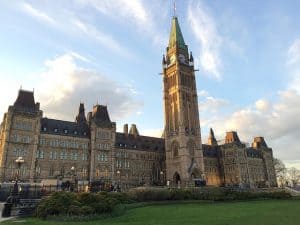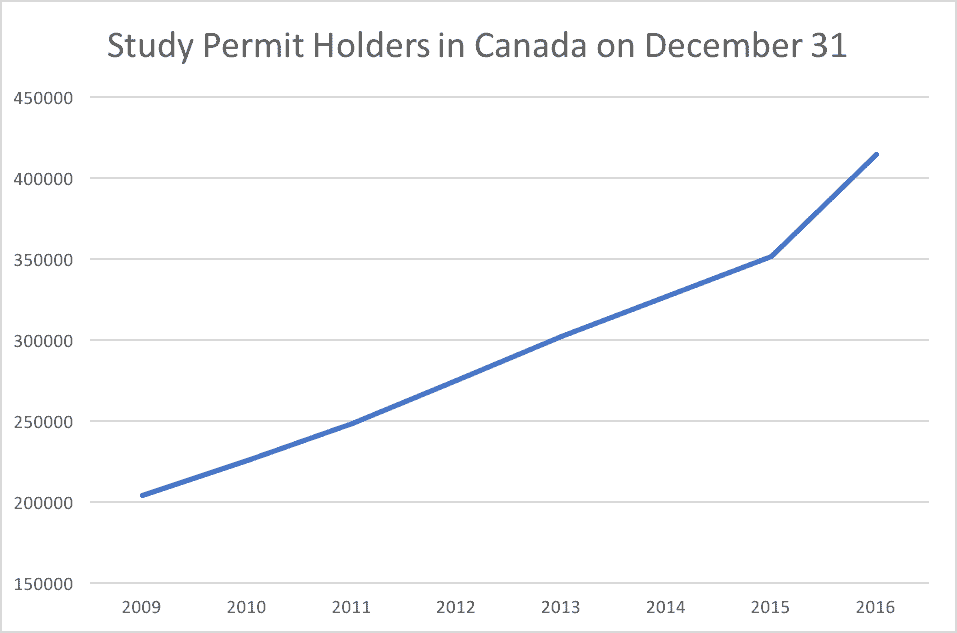 October 14, 2017 – Experts say difficulty navigating Canada’s immigration system is causing international students who had planned a new life in Canada to instead return home after graduation.
October 14, 2017 – Experts say difficulty navigating Canada’s immigration system is causing international students who had planned a new life in Canada to instead return home after graduation.
Figures from Statistics Canada showed only a quarter of students who studied in Canada achieved permanent residency after graduation between 2004 and 2013.
The current federal government has taken many steps to make it easier for international students to gain permanent residence since coming to power in 2015. But this remains a significantly low number for a group described as ideal candidates for permanent residency by successive Canadian immigration ministers.
Livestream Video: How International Students Can Immigrate to Canada
International students are generally young, have lived in Canada, know one or both languages and have work experience, some of the key factors that lead to long-term labour market success.
But many are saying Canada’s immigration system changes so often that it is difficult to plan for a permanent residence application after graduation.
Numbers of international students choosing to study in Canada are significantly on the rise, with nearly 415,000 study permit holders at the end of 2016, up from just over 204,000 seven years previously.
The figures also show a significant increase of nearly 63,000 study permits between 2015 and 2016 alone. A sharper increase is forecast for 2017, with universities reporting significant increases in intake numbers following Donald Trump’s victory in the U.S. presidential election.

Source: Immigration, Refugees and Citizenship Canada
Since coming to power in fall 2015, the federal Liberal government has attempted to make it easier for international students to gain permanent residence.
At the federal level, the government has introduced points under Canada Express Entry. In November 2016, Comprehensive Ranking System points were added for three-year post secondary, master’s, professional degrees and doctorates (30 CRS points) and post-secondary diplomas lasting one or two years (15 CRS points). No points are awarded for a Canadian high school education or below. This gives many graduates the extra push they need to achieve a coveted Invitation to Apply.
The federal government and relevant provinces also promote the Atlantic Immigration Pilot, which includes a category aimed at international graduates. It was introduced earlier in 2017 to try and reverse aging populations and shrinking labour markets in the Atlantic provinces of Nova Scotia, Newfoundland & Labrador, New Brunswick and Prince Edward Island.
Read More
Livestream Video: How International Students Can Immigrate to Canada
Canada Offers International Graduates Attractive Pathway to Permanent Immigration
Canada Slashes Processing Time for Post-Graduation Work Permit Applications
Calling International Students: Here Are Canada’s Best Universities
In Quebec, the international graduate stream, which forms part of the Quebec Experience Program, is the only provincial program that offers permanent immigration to diploma and undergraduate degree holders, without a job offer.
The category imposes an advanced intermediate oral French requirement, but this stipulation is waived if half of the candidate’s studies are completed in Quebec and the qualification is recognized by the province. Candidates must either complete their studies in French or pass a French language test to transition to Canadian permanent residence.
The Ontario Immigrant Nominee Program runs a similar program without the need for a job offer, but it is aimed at Master’s and PhD graduates. The education requirement, therefore, is much more onerous, and the candidate must have English or French at Canadian Benchmark Level 7 or higher. The Ontario Master’s and PhD streams are open periodically throughout the year.
International students can already qualify to work in Canada after graduation by applying for a Post Graduate Work Permit. Here they can gain valuable Canadian work experience through a special work permit issued for the length of the study program, up to a maximum of three years. The work experience could then be used to qualify for permanent residence, through one of the above avenues.
Post Graduate Work Permit Requirements:
- Studied full time in Canada in a program of at least 8 months duration.
- Graduated from a public post-secondary institution, a private post-secondary institution, or a private institution authorized by provincial statute to confer degrees.
- Submit an application for a work permit within 90 days after receiving written confirmation of completing a study program.
- Received notification of eligibility to obtain a degree, diploma or certificate.
- Possess a valid Canada study visa or Canada study permit.
Citizenship Made Easier
Recent changes to Canadian citizenship requirements are also beneficial to international students, allowing them to count their time spent in Canada while studying towards a citizenship application. Study permit holders can count a half day for each full day spent in Canada towards a citizenship application, up to a maximum of a year.
At the same time the overall physical presence requirement was reduced from four years in six to three years in five, allowing international students to become Canadian citizenships just two years after graduation.
Interested employers: Kindly contact us here to receive further information.
Interested candidates: Find out whether you qualify to Canada by completing our free on-line evaluation. We will provide you with our evaluation within 1-2 business days.
Read more news about Canada Immigration by clicking here.




